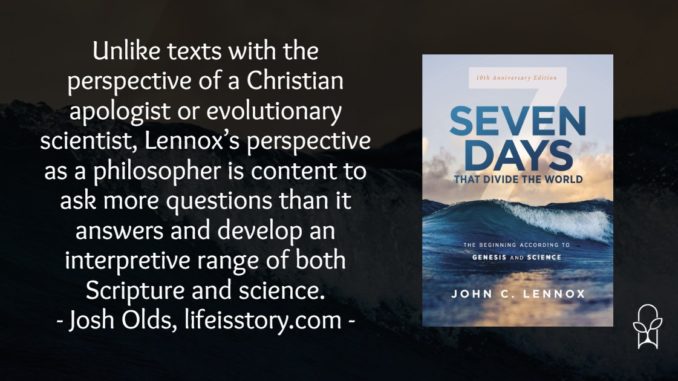
Also by this author: 2084: Artificial Intelligence, the Future of Humanity, and the God Question
Published by Zondervan on October 12, 2021
Genres: Non-Fiction, Apologetics
Buy on Amazon
Goodreads

Now revised and updated--John Lennox's acclaimed method of reading and interpreting the first chapters of Genesis without discounting either science or Scripture.
What did the writer of Genesis mean by "the first day?" Are the seven days in Genesis 1 a literal week or a series of time periods? If I believe that the earth is 4.5 billion years old as cosmologists believe, am I denying the authority of Scripture?
With examples from history, a brief but thorough exploration of the major interpretations, and a look into the particular significance of the creation of human beings, Lennox suggests that Christians can heed modern scientific knowledge while staying faithful to the biblical narrative. He moves beyond a simple response to the controversy, insisting that Genesis teaches us far more about the God of Jesus Christ and about God's intention for creation than it does about the age of the earth.
With this book, Lennox offers a careful and accessible introduction to a scientifically-savvy, theologically-astute, and Scripturally faithful interpretation of Genesis.
Since its publication in 2011, this book has enabled many readers to see that the major controversy with which it engages can be resolved without compromising commitment to the authority of Scripture. In this newly revised and expanded edition, John clarifies his arguments, responds to comments and critiques of the past decade since its first publication. In particular, he describes some of the history up to modern times of Jewish scholarly interpretation of the Genesis creation narrative as well as spelling out in more detail the breadth of views in the Great Tradition of interpretation due to the early Church Fathers. He shows that, contrary to what many people think, much of the difficulty with understanding the biblical texts does not arise from modern science but from attempting to elucidate the texts in their own right.
Ten years ago, John C. Lennox penned a small book called Seven Days that Divide the World, an introductory yet academically robust volume that explored the tension between Scripture and science when it comes to creation. This 10th anniversary edition clarifies some concepts, responds to some valid criticisms, and updates some scientific understanding. It’s important to note that Lennox is not a scientist by training. His academic specialty is mathematic, though he does also have a degree in bioethics. Rather, Lennox’s approach to the intersection of science and religion has always been as a trained academic and philosopher. Now, with someone of Lennox’s standing, that may be a distinction without difference, but I feel like it underlies a lot of Lennox’s methodology.
Seven Days that Divide the World is not a book to come to for concrete answers. Lennox seems to settle on a form of Old Earth creationism. He doesn’t preclude Young Earth creationism as a theological interpretation, but finds it at odds with science. Conversely, he finds theistic evolution to be plausible from science but not supported theologically. He is careful to navigate the tensions between Scripture and science, giving each due deference in an attempt to come to a conclusion that honors both.
My major issue with the book is that Lennox does not appear to have a great grasp on the science. Lennox begins by comparing the young earth v. old earth debate to the heliocentric v. geocentric debate of the Middle Ages. His point appears to be that the church rightfully held on to its understood exegesis until the preponderance of evidence forced them to accept that their exegesis (not Scripture itself) was wrong. As such, he attempts to say a sort of “we’ve been here before” to his audience. The difference is that we can be 100% sure of heliocentrism. We have a multitude of ways of measuring it, including sending people to space to visually see it is the case. We have no such way of measuring the age of the earth or considering origins. As such, the crux of the book’s introduction fails.
The highlight of the book is really his evaluation of ancient Jewish and Christian interpretations, showing that the Old Earth creationism was a standard view even before Darwin, debunking the YEC talking point that anything other than a literal 7-days-of-24-hours creation around 6,000 years ago is a modern, liberal reading. Lennox also invites readers to sit in the mystery. Unlike texts with the perspective of a Christian apologist or evolutionary scientist, Lennox’s perspective as a philosopher is content to ask more questions than it answers and develop an interpretive range of both Scripture and science.
Seven Days that Divide the World doesn’t necessarily pick a side and demand fealty as much as it entreats readers to sit in the tension and mystery, to debate and discuss but come together in unity. In closing, Lennox sets forth what Genesis for sure teaches us. That list is simpler, yet more profound than you might think: 1) God exists, 2) God is eternal creator. 3) God is distinct from creation, 4) God is personal, 5) God is a fellowship, 6) God has a goal in creation, 7) God creates by his Word, 8) God is the source of light, 9) Creation is good, 10) Sabbath is important. Honestly, I would have preferred if Lennox had set aside chapters that came before and spent more time elaborating on each of these points. But, I suppose, that would be another book.
